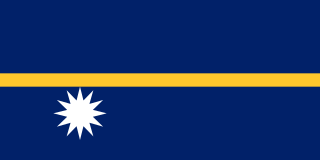
History of Nauru, is about Nauru, an island country in the Pacific Ocean. Human activity is thought to have begun roughly 3,000 years ago when clans settled the island. A people and culture developed on the island, the Nauru which had 12 tribes. At the end of the 1700s, a British ship came, and this was the first known contact with the outside world. The British ship called it "pleasant island" and it was a friendly greeting; the British sailed on. Thirty years later, in 1830, an escaped Irish convict took over the island and was finally evicted in 1841. There were scattered interactions with passing vessels and trade. In the mid-to-late 19th century, a devastating civil war started, which took the lives of many Nauru. This war was ended when Germany annexed the island in 1888, and negotiations ended the fighting. In the 1900s, phosphate mining started, and the Germans built some modern facilities on the island. German control ended at the end of World War I, and it was passed to Australia as protectorate. This continued until WW2, when the Empire of Japan invaded the island. Although it was occupied for a few years, many Nauru died at this time, and much of the population was deported from the island and/or used for slave labor. With the surrender of Japan, the Nauru were returned to the island, and it was put under Australian administration again, under the condition it would become independent. This happened in 1968, and Nauru has been a stable democracy since that time. In the last three decades of the 20th century, Nauru had enormous per capita wealth from the phosphate mining, to the point they were some of the richest people on the planet. However, when this ended and the investments were depleted, it has had a harder time, and international aid is important in the 21st century.
From 1916 to 1975, Tuvalu was part of the Gilbert and Ellice Islands colony of the United Kingdom. A referendum was held in 1974 to determine whether the Gilbert Islands and Ellice Islands should each have their own administration. As a consequence of the referendum, the separate British colonies of Kiribati and Tuvalu were formed. Tuvalu became fully independent as a sovereign state within the Commonwealth on 1 October 1978. On 5 September 2000, Tuvalu became the 189th member of the United Nations.

The Group of Western European and Other States, also known as the Western European and Other States Group or WEOG, is one of the five United Nations regional groups. It is composed of 28 member states. Most of these are in Western Europe, but the group also includes Australia, Canada, Greece, Israel, New Zealand, and Turkey. The United States and Vatican City participate as observers.

The United Liberation Movement for West Papua (ULMWP) is an organization formed from the merger of three political independence movements seeking independence for Western New Guinea from Indonesia. The ULMWP was formed on 7 December 2014 in Vanuatu uniting the Federal Republic of West Papua (NRFPB), the West Papua National Coalition for Liberation (WPNCL) and the National Parliament of West Papua (NPWP).

The United Nations Regional Groups are the geopolitical regional groups of member states of the United Nations. Originally, the UN member states were unofficially organized into five groups as an informal means of sharing the distribution of posts for General Assembly committees. Now this grouping has taken on a much more expansive and official role. Many UN bodies are allocated on the basis of geographical representation. Top leadership positions, including Secretary-General and President of the General Assembly, are rotated among the regional groups. The groups also coordinate substantive policy and form common fronts for negotiations and bloc voting.

Oceania is, to the People's Republic of China and the Republic of China, a stage for continuous diplomatic competition. The PRC dictates that no state can have diplomatic relations with both the PRC and the ROC. As of 2024, eleven states in Oceania have diplomatic relations with the PRC, and three have diplomatic relations with the ROC. These numbers fluctuate as Pacific Island nations re-evaluate their foreign policies, and occasionally shift diplomatic recognition between Beijing and Taipei. The issue of which "Chinese" government to recognize has become a central theme in the elections of numerous Pacific island nations, and has led to several votes of no-confidence.
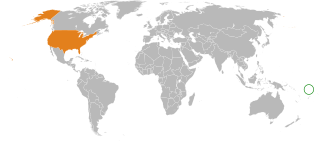
Tuvalu – United States relations are bilateral relations between Tuvalu and the United States.
Cuban-Pacific relations are diplomatic, economic, cultural, and other relations between the Cuba and countries situated in Oceania. In the 2000s, Cuba has been strengthening its relations with Pacific nations, which have, for the most part, responded favorably to Cuban medical aid in particular. The first Cuba-Pacific Islands ministerial meeting was held in September 2008 in Havana, with government members from ten Pacific countries—Kiribati, Tuvalu, Nauru, Solomon Islands, Fiji, Tonga, Vanuatu, Samoa, the Federated States of Micronesia and Papua New Guinea—attending. The meeting was a consolidation rather than a starting point of Cuban-Pacific relations.
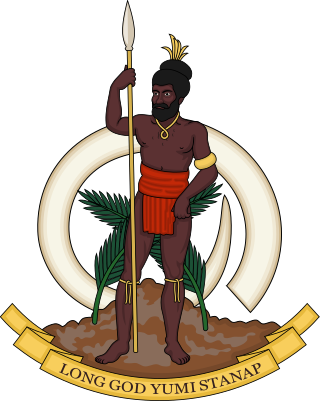
The Republic of Vanuatu has been a member of the United Nations since the year of its independence in 1980. The country was a particularly active member in the 1980s, when, governed by Prime Minister Father Walter Lini and represented by Ambassador Robert Van Lierop, it was a consistent advocate for decolonisation. Subsequently, its emphasis within the United Nations shifted to the issue of climate change and the vulnerability of Small Island Developing States.
Fiji established its Permanent Mission to the United Nations on 13 October 1970, three days after obtaining its independence from the United Kingdom. Since then, Fiji's participation in the United Nations has been notable primarily for its active role in UN peacekeeping operations, which began in 1978.
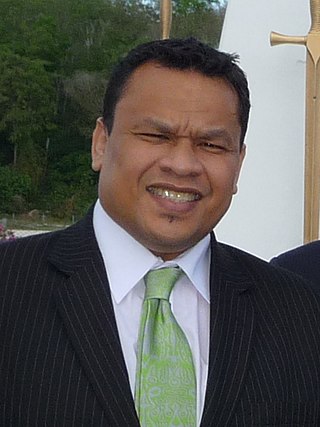
Sprent Arumogo Dabwido was a Nauruan politician who served as President of Nauru between 2011 and 2013, and was also a weightlifter. The son of a parliamentarian, Dabwido was originally elected to the Meneng Constituency in the Parliament of Nauru at the 2004 elections. Having served as Minister for Telecommunications in Marcus Stephen's government from 2009, Dabwido joined the Nauruan opposition faction in November 2011 after Stephen's resignation, and, having passed a motion of no confidence against interim president Freddie Pitcher, was elected president four days later. In his role as president, Dabwido functioned as chairman of the Cabinet of Nauru, and held various portfolios in the Nauruan government.
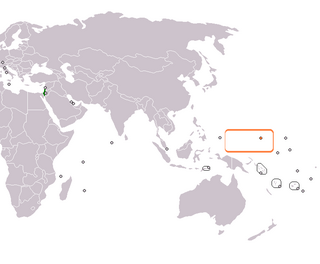
Israel – Micronesia relations are diplomatic and other relations between the State of Israel and the Federated States of Micronesia. Israel was among the first countries to establish formal diplomatic relations with Micronesia.

The general debate of the sixty-sixth session of the United Nations General Assembly was the first debate of the 66th session of the United Nations General Assembly that ran from 21 – 27 September 2011. Leaders from the United Nations' member states addressed the General Assembly concerning topics of national, regional and international importance.

The general debate of the sixty-seventh session of the United Nations General Assembly was the first debate of the 67th session of the United Nations General Assembly that ran from 25 September – 1 October 2012. Leaders from the United Nations' member states addressed the General Assembly concerning topics of national, regional and international importance.

India–Nauru relations are the international relations that exist between India and Nauru. These have been established since the island's independence in 1968.
The Ministry of Justice and Border Control of Nauru upholds the Constitution, provides legal advice to the federal government and represents the interests of the country in civil and criminal matters. It is divided into six sections:

The general debate of the sixty-fourth session of the United Nations General Assembly was the first debate of the 64th session of the United Nations General Assembly that ran from 23–29 September 2009. Leaders from a number of member states addressed the General Assembly.

Minute Alapati Taupo OBE was a Tuvaluan politician, diplomat, economist and accountant. Taupo was elected to the Parliament of Tuvalu in the 2019 Tuvaluan general election to represent the Nanumanga electorate. He was appointed Deputy Prime Minister & Minister for Fisheries and Trade in the Natano Ministry.

The fifty-fifth session of the United Nations General Assembly opened on 5 September 2000 at the UN Headquarters in New York City. The president was former Prime Minister of Finland Harri Holkeri.











